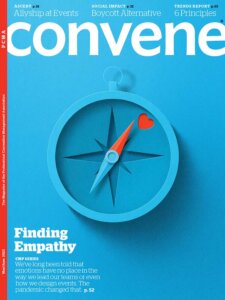
Organizations “can — it’s not even a heavy lift — do the work of understanding what someone needs and being able to find points of accommodation in concert with that person,” says future of work expert Chris Shipley.
If you missed the first part of our interview with future of work experts and coauthors Heather E. McGowan and Chris Shipley, you can catch up at ‘It’s About Having Empathy All the Way Around.’ Let’s pick up where we left off, at the point where they dispute the notion that cultivating soft skills makes you a soft leader.

This interview is part of our May/June cover and CMP Series story package. Find the print facsimile edition here.
One assumption is that when you lead with empathy, you make allowances for performance based on challenges team members may have. But isn’t that a slippery slope — you continue to have lower expectations?
Shipley: When I hear the term “making allowances,” it implies a one-directional engagement. “I know that you are having trouble at home, so I’m going to make allowances for that,” versus, “Hey, I hear things aren’t going well. Can we talk? What do you need? How can we work together?” Which isn’t about cutting slack, it’s actually honoring the idea that someone has a varying set of needs and that the organization can at least discuss those in a way that brings an agreement to where the latitude will happen, what accommodation can be made so that again you allow that employee to continue to have agency in their own challenges as well.
McGowan: Just because you have empathy doesn’t mean you can’t make hard decisions. Just because you have empathy doesn’t mean that you can expect less of everybody forever. What you do is you make accommodations for instances and circumstances. If somebody’s going through something that’s a hard time, that’s not forever, that’s for that period of time. There’ll be other periods of time.

Heather E. McGowan (left) and Chris Shipley
I’ll give you a great example. Someone I work with in the speaking business was having just a horrible year. Her mother got cancer and then it became untreatable and she went into hospice, so she moved to another country to take care of her. It was fortunately during COVID times where everybody could work remotely, so she continued to work off-cycle — she’d take care of her mother for eight hours and then work for nine hours. Her organization where she’s one of the most senior people — been there about 25 years — could have just said, “Here’s a big bonus. God, we know what you’ve been through.” Instead, they knew her best friend and talked to her and said, “Can you go over to Europe for two weeks? We’ll fly you over there. We’ll pay for everything. You know better than we know how to help her. We just want to be the best support we can be for her.” That was personalized, it was thoughtful, and it probably cost a whole lot less than any bonus they could have given her to have the same magnitude. She said to me, “I will never leave that company.” That’s the way that you can make accommodations with people, be empathetic, personalize things, act like a human. Then if you got somebody on this other side who knows what that means, you’ve picked well — they are going to be loyal and they are going to perform.
Shipley: It’s a fantastic story. Not every organization is going to be able to send a best friend to Europe. They can — it’s not even a heavy lift — do the work of understanding what someone needs and being able to find points of accommodation in concert with that person. I think that’s the difference from thinking, “I need to solve everybody’s problems and everybody has to be happy all the time.” None of us can do that.
McGowan: This has become even more [evident] since we published the book — all the ways we’ve been trying to do things by being a hard ass and driving people through fear and sometimes humiliation, it’s making it worse and worse every day. Our productivity numbers are down, people are working fewer hours, we’ve had higher levels of disengagement over the last two years.
What we’re doing isn’t working; we need a different approach. We really believe it’s trying to understand your people. Trying to be human at work. You still have to make difficult decisions, you still have to run the business, but the focus is really not on productivity because that’s just measuring activities, that’s not performance.
Michelle Russell is editor in chief of Convene.
